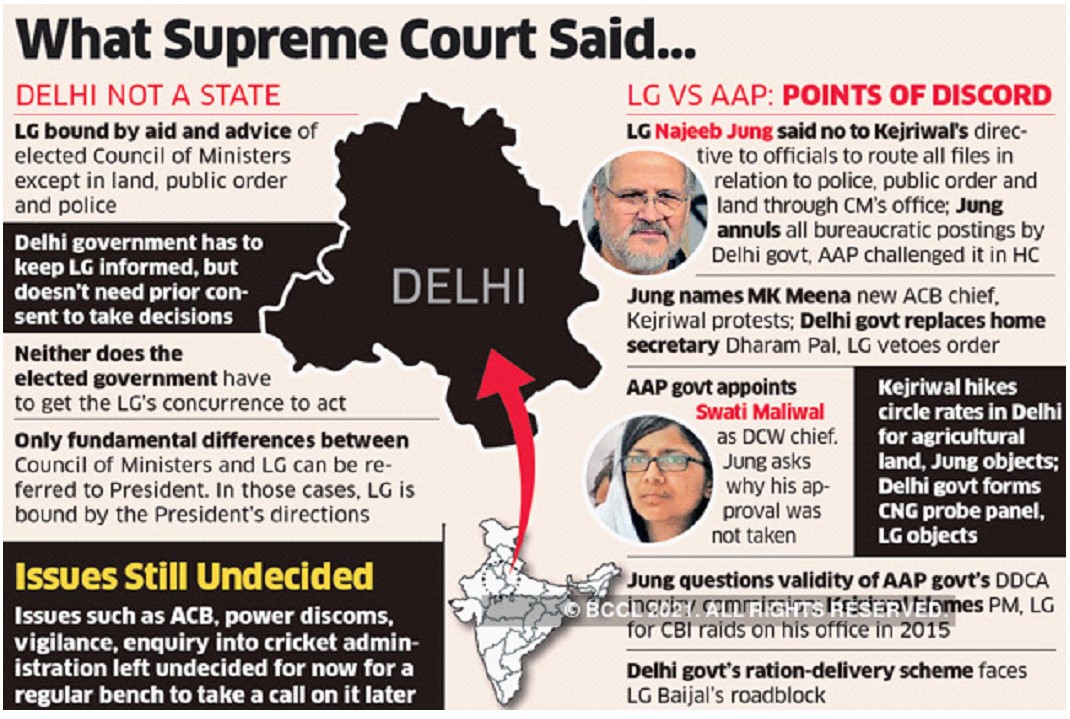
Disclaimer: Copyright infringement not intended.
Context
- The Government of National Capital Territory of Delhi (Amendment) Bill, 2023 is scheduled to be taken up in the Lok Sabha today for consideration and passing.
Key Details:
- The Bill is to amend the Government of National Capital Territory of Delhi Act 1991.
- It empowers the Central Government to make rules in connection with the affairs of the Government of the National Capital Territory of Delhi including the functions, terms, and other conditions of service of officers and employees.
- It also has a provision in the constitution of the National Capital Civil Service Authority. The authority consists of the Delhi Chief Minister, the Chief Secretary of Delhi, and the Principal Home Secretary of Delhi.
- The Authority will make recommendations to Delhi Lieutenant Governor regarding transfers and postings of officials and disciplinary matters.
- The Centre had brought an ordinance in this regard in May this year.
About the Government of National Capital Territory of Delhi (Amendment) Bill 2023
Highlights of the Bill
- The Bill establishes the National Capital Civil Services Authority, which consists of the Chief Minister, Chief Secretary of Delhi, and Principal Home Secretary of Delhi.
- The Authority will make recommendations to the Lieutenant Governor (LG) regarding transfers and postings of officials and disciplinary matters.
- The Bill empowers the LG to exercise his sole discretion on several matters including those recommended by the National Capital Civil Services Authority, and the summoning, prorogation, and dissolution of the Delhi Legislative Assembly.
- It authorizes department secretaries to bring to the notice of the LG, the Chief Minister and the Chief Secretary any matter that may bring Delhi Government into controversy with the Central Government.
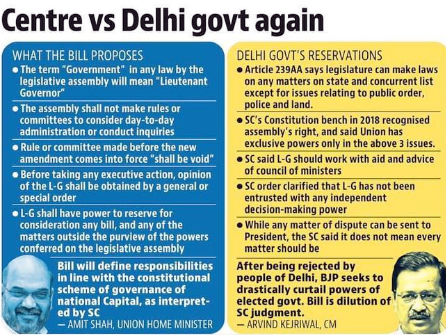
Disclaimer: Copyright infringement is not intended
Key Issues and Analysis:
- Conferring powers over the transfer and posting of officers to the Authority may break the triple chain of accountability that links the civil services, ministers, the legislature and citizens.
- This may violate the principle of parliamentary democracy, which is a part of the basic structure doctrine.
- The LG has been granted sole discretion in several matters including when the Legislative Assembly will convene.
- This implies that the Chief Minister may be unable to convene a session needed for essential government business.
- Department secretaries will bring certain matters directly to the LG, Chief Minister and the Chief Secretary, without consulting the concerned minister.
- This may go against the collective responsibility of the Cabinet, as the concerned ministers cannot provide their input.
Key Features:
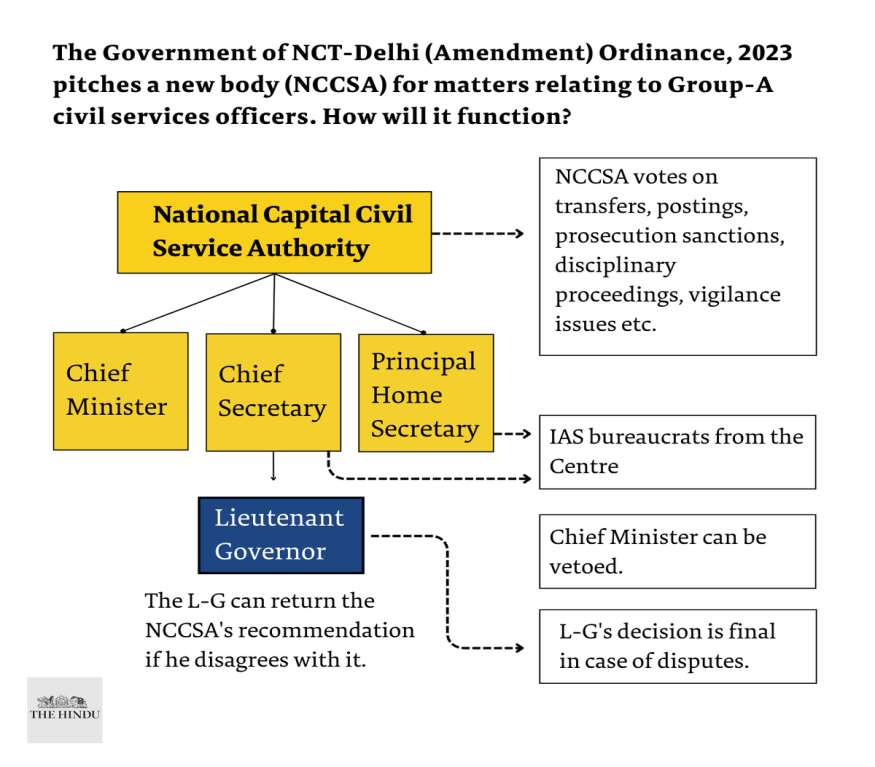
National Capital Civil Services Authority:
- The Bill establishes the National Capital Civil Services Authority to make recommendations to the Lieutenant Governor of Delhi (LG) on certain matters related to services.
These include:
- Transfers and postings,
- Matters related to vigilance,
- Disciplinary proceedings, and
- prosecution sanctions of Group A of All India Services (except Indian Police Service), and DANICS.
The Authority will consist of the:
- Chief Minister of Delhi as Chairperson,
- Principal Home Secretary of the Delhi government as Member Secretary, and
- Chief Secretary of the Delhi government as a member.
https://prsindia.org/billtrack/the-government-of-national-capital-territory-of-delhi-amendment-bill-2023#:~:text=The%20Bill%20establishes%20the%20National,of%20officials%20and%20disciplinary%20matters.
- The central government will appoint both the Principal Home Secretary and Chief Secretary. All decisions of the Authority will be based on a majority vote of the members present and voting. The quorum for a meeting is two people.
Powers of the Lieutenant Governor:
- Under the Act, matters where the LG may act at his discretion are:
- matters outside the legislative competence of the Delhi Legislative Assembly but which have been delegated to the LG, or
- matters where he is required by law to act in his discretion or exercise any judicial or quasi-judicial functions. The Bill specifies that in these matters, the LG will act in his sole discretion.
- It expands the discretionary role of the LG by giving him powers to approve the recommendations of the Authority or return them for reconsideration. In the case of a difference of opinion between the LG and the Authority, the former's decision will be final.
Disposal of matters by Ministers:
- A Minister of the Delhi government may issue standing orders for the disposal of matters brought to his attention.
- The order should be issued in consultation with the concerned Department Secretary. Certain matters must be submitted to the LG, through the Chief Minister and the Chief Secretary, for his opinion prior to the issue of any order.
Duties of Secretaries:
- Additionally, the concerned Department Secretary must bring certain matters to the notice of the LG, the Chief Minister, and the Chief Secretary.
- These include matters which may bring the Delhi Government into controversy with the central or any state government, the Supreme Court, or the High Court of Delhi.
The Bill may be violating the Constitution:
Delhi government not having control over services may violate the basic structure
- The Authority has three members, two of whom (Chief Secretary and Principal Home Secretary) are appointees of the Central Government.
- These members can in effect outvote the Chief Minister of Delh Further, the Bill grants the LG the power to override the recommendations of the Authority.
- Therefore, the Bill effectively gives the central government powers over services in Delhi. If the Delhi government does not have control over civil servants, it cannot execute any programs across any sector in its jurisdiction.
- This may violate the triple chain of accountability, which is an essential feature of parliamentary democracy.
- The Supreme Court explained this principle in the recent 2023 judgment.
- It stated that democratic government rests on a triple chain of accountability:
- civil servants are accountable to ministers,
- ministers are accountable to legislatures, and
- legislatures are accountable to the electorate.
- A democratically elected government must be able to have control over and hold accountable public officers posted in the service of his government. By severing the first link of the triple chain of accountability, the Bill may be contradicting the principles of parliamentary democracy.
The LG may not be bound to act on the aid and advice of the Council of Ministers:
- As per Article 239AA, the LG has to act on the aid and advice of the Council of Ministers, except when exercising his functions at his discretion.
- The Transaction of Business Rules of the GNCTD, 1993 provides that certain matters must be submitted to the LG, through the Chief Minister and Chief Secretary, for his opinion prior to the issue of any order.
- The Bill expands the mentioned matters to include the relations of the Delhi government with the central government.
- These provisions may violate the principle of the LG acting on the aid and advice of the Council of Ministers on matters within the executive competence of the latter.
- They also contradict the 2018 judgment of the Supreme Court which stated that the decision-making power lies with the elected government.
- This implies that the Chief Minister may not be able to convene a session of the Assembly for any essential government business.
Certain terms in the Bill are unclear:
The criteria for certain matters brought to the notice of the LG may be overbroad:
- Under the Bill, the concerned department secretary must bring certain matters to the notice of the LG, the Chief Minister, and the Chief Secretary.
- These include matters which may bring the Delhi Government into controversy with the central or any state government, the Supreme Court, or the High Court of Delhi. It is not clear what matters would be considered controversial.
- Moreover, this provision enables department secretaries to bring certain matters directly to the LG, Chief Minister and Chief Secretary, without consulting the concerned minister.
- This would break the usual chain of command as issues related to the ministry would have no input from the concerned minister. This also may go against the principle of collective responsibility of the cabinet.
Closing thoughts
- The 2023 judgment re-iterates the principle spelled out by the 2018 judgment that ministers bear the responsibility before the legislature for every action undertaken by public officials in their respective departments. However, under the Bill, a minister of Delhi will not be able to hold his public officials accountable for bureaucratic delays.
https://newsonair.gov.in/Main-News-Details.aspx?id=465303
https://newsonair.gov.in/Main-News-Details.aspx?id=465355
https://prsindia.org/billtrack/the-government-of-national-capital-territory-of-delhi-amendment-bill-2023
https://indianexpress.com/article/political-pulse/delhi-services-bill-introduced-in-lok-sabha-amid-opposition-protest-8871222/
.jpg)
The Goods and Services Tax (GST) Council
Context
- The Goods and Services Tax (GST) Council in its meeting today is likely to finalise the modalities for the determination of supply value in online gaming and casinos for levying a 28 percent tax.
Details
- The Council, chaired by Union Finance Minister Nirmala Sitharaman and comprising state ministers, in its last meeting on July 11 approved levying a 28 percent tax on the full face value of bets in online gaming, casinos and horse racing.
- Subsequently, the Law Committee, comprising Centre and state tax officers, has prepared draft rules for consideration by the GST Council with regard to the computation of supply value for tax purposes.
- The Council will discuss the committee's recommendations in a virtual meeting today. The All-India Gaming Federation, which represents companies had termed the decision by the GST Council as ‘unconstitutional, irrational, and egregious.
About GST Council:
|
About
|
·It is a constitutional body for making recommendations to the Union and State Government on issues related to Goods and Service Tax.
|
|
Chaired by
|
·The GST Council is chaired by the Union Finance Minister and other members are the Union State Minister of Revenue or Finance and Ministers in charge of Finance or Taxation of all the States.
|
|
Under Article
|
·As per Article 279A of the amended Constitution, the GST Council will be a joint forum of the Centre and the States.
|
|
Mechanism
|
·Between the Government of India and one or more States; or
·Between the Government of India and any State or States on one side and one or more other States on the other side; or between two or more States, arising out of the recommendations of the Council or implementation thereof.
|
https://newsonair.gov.in/News?title=Finance-Minister-Nirmala-Sitharaman-to-chair-GST-Council-meeting-today&id=465350
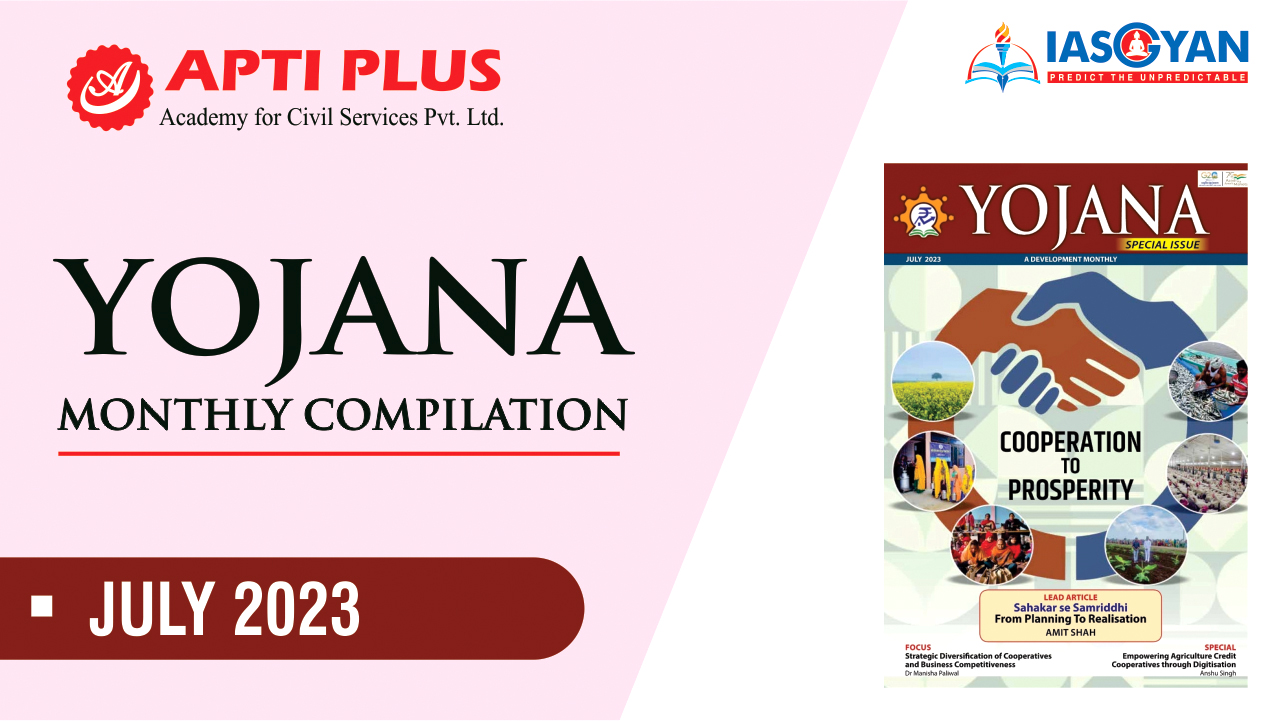
Abrogation of Article 370
Context
- The Supreme Court today commenced hearing on a batch of petitions challenging the abrogation of Article 370 of the Constitution that bestowed special status on the erstwhile state of Jammu and Kashmir.
Details:
- A five-judge constitution bench headed by Chief Justice DY Chandrachud will conduct day-to-day hearings on the matter.
- Senior advocate Kapil Sibal, who will lead the arguments on behalf of petitioners challenging the abrogation, said he will continue his submissions till tomorrow.
- Chief Justice Chandrachud said the court will allow the lead counsel from the petitioner's side to argue on all aspects and the rest of the counsel can add on certain aspects so that there are no overlapping arguments.
- Several petitions challenging the abrogation of the provisions of Article 370 and the Jammu and Kashmir Reorganisation Act, 2019, which split the erstwhile state into two union territories - Jammu and Kashmir, and Ladakh- were referred to a constitution bench in 2019.
About Article 370:
- Article 370 was the basis of Jammu and Kashmir’s accession to the Indian Union at a time when erstwhile princely states had the choice to join either India or Pakistan after their independence from British rule in 1947.
- The article, which came into effect in 1949, exempts Jammu and Kashmir states from the Indian constitution.
- It allows the Indian-administered region jurisdiction to make its laws in all matters except finance, defense, foreign affairs and communications.
- It established a separate constitution and a separate flag and denied property rights in the region to outsiders.
- That means the residents of the state live under different laws from the rest of the country in matters such as property ownership and citizenship.
Closing thoughts:
- The Supreme Court of India will begin hearing oral arguments in the case concerning the abrogation of Article 370 of the Constitution.
- The changes made to Article 370 through measures that commenced with a presidential order issued nearly four years ago, were, by all accounts, seismic in proportion.
- Amendments were made to make applicable the entirety of India’s Constitution to Jammu and Kashmir (J&K). The State was also sundered into two Union Territories: J&K and Ladakh.
https://newsonair.gov.in/News?title=Supreme-Court-commences-hearing-on-petitions-challenging-abrogation-of-Article-370&id=465354
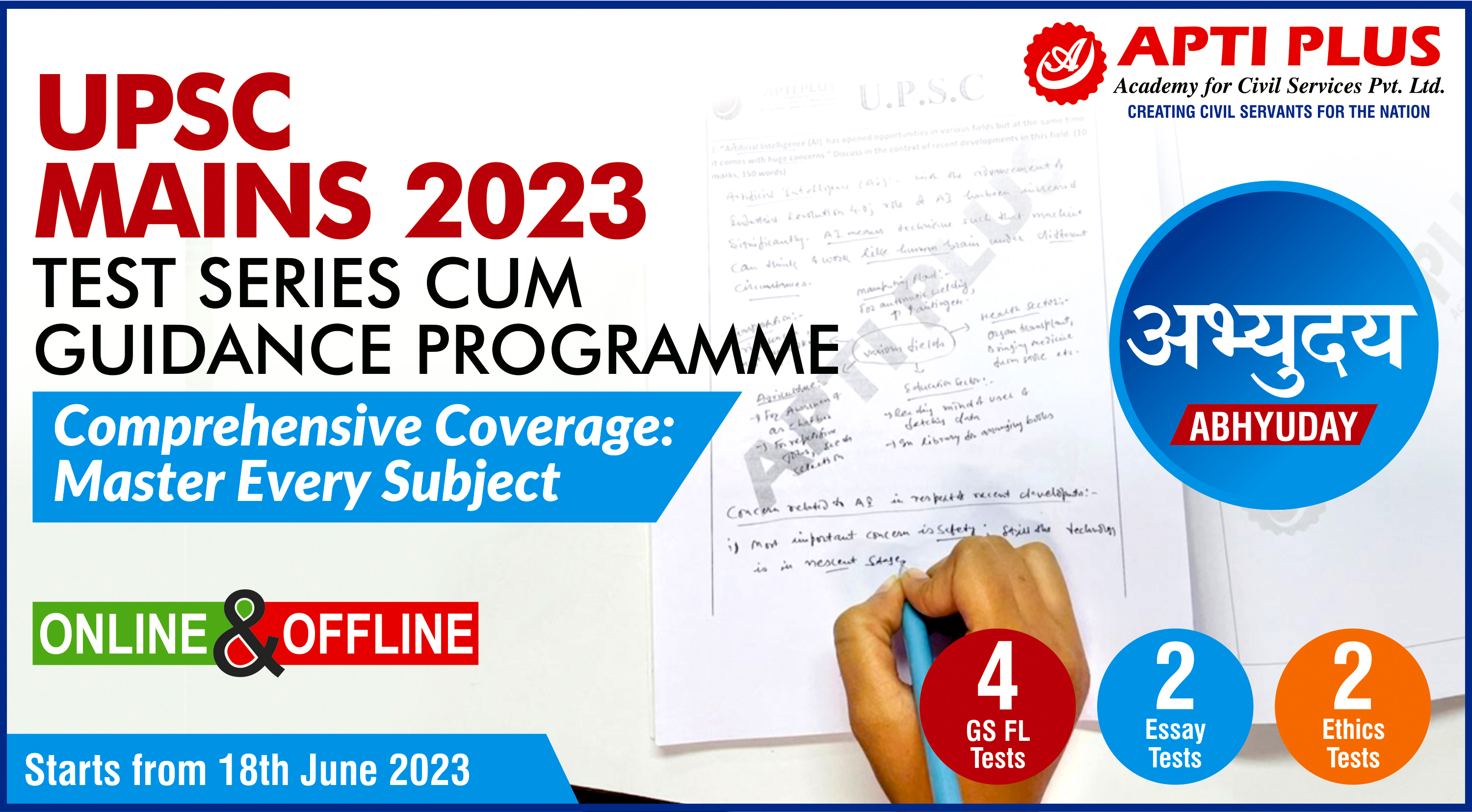
Preventive measures to deal with Cybercrime
Context
- The Centre has said that various preventive measures are being taken to deal with cybercrimes that particularly affect children.
Details
- In a reply in the Lok Sabha, Minister for Electronics and Information Technology Ashwini Vaishnaw said the Home Ministry provided financial assistance to States and union territories under the Cyber Crime Prevention against Women and Children scheme for capacity building.
- He said cyber forensic-cum-training laboratories have been commissioned in 30 States and union territories so far. Mr. Vaishnaw said the government blocked websites from time to time containing child sexual abuse material.
- He added the Ministry of Electronics and Information Technology is implementing the second phase of the Information Security Education and Awareness project to build capacities in the area of information security and train government personnel.
About the Information Technology (Intermediary Guidelines and Digital Media Ethics Code) Rules, 2021:
- The Information Technology (Intermediary Guidelines and Digital Media Ethics Code) Rules, 2021, was notified by the Central government, relates to digital news publishers, including websites, portals and YouTube news channels, and Over the Top (OTT) platforms, which stream online content such as web series and films.
- It is jointly administered by the Ministry of Electronics and IT, and the Ministry of Information and Broadcasting.
Preventive measures:
- A 3-tier Grievance Redressal Mechanism: Social media intermediaries shall appoint a Grievance Officer to deal with complaints and share the name and contact details of such officers.
- The grievance officer shall acknowledge the complaint within twenty-four hours and resolve it within 15 days from its receipt.
- Ensuring Online Safety and Dignity of Users, Especially Women Users: Intermediaries shall remove or disable access within 24 hours of receipt of complaints of contents that expose the privacy of individuals.
- Such a complaint can be filed either by the individual or by any other person on his/her behalf.
- Voluntary User Verification Mechanism: Users who wish to verify their accounts voluntarily shall be provided with an appropriate mechanism to verify their accounts and provided with a demonstrable and visible mark of verification.
- Giving Users an Opportunity to Be Heard: Users must be provided with an adequate and reasonable opportunity to dispute the action taken by the intermediary.
- Removal of Unlawful Information: An intermediary upon receiving actual knowledge should not host or publish any information which is prohibited under any law in relation to the interest of the sovereignty and integrity of India, public order, friendly relations with foreign countries, etc.
https://newsonair.gov.in/News?title=Centre-says-various-preventive-measures-being-taken-to-deal-with-cybercrimes-that-particularly-affect-children&id=465370
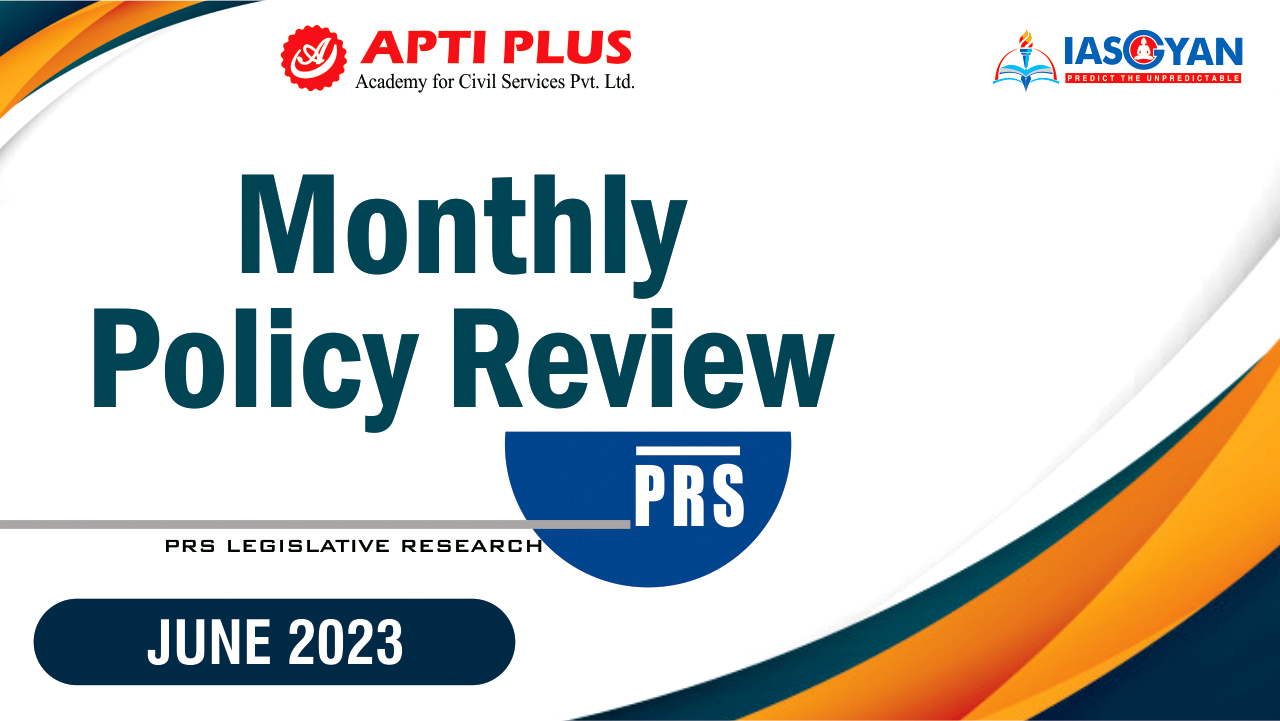
The National Investigation Agency
Context
- The National Investigation Agency, NIA, has arrested another person in the car bomb blast case which took place in Coimbatore in October last year.
Details:
- The prime accused was killed in the terror explosion triggered by a vehicle-borne Improvised Explosive Device, IED. Mohammed Idris, a resident of Coimbatore, has been arrested for conspiring with other accused persons to commit the ISIS-inspired terror attack.
- The attack had taken place in front of the ancient Arulmigu Kottai Sangameshwarar Thirukovil temple in Coimbatore.
- NIA had filed two separate charge sheets in the case before the NIA Court, Chennai against eleven accused.
About National Investigation Agency:
- Established: The National Investigation Agency (NIA) Act of 2008 established the National Investigation Agency (NIA).
- Function: It is a central agency charged with investigating and prosecuting crimes. Harming India's sovereignty, security, and integrity, as well as state security and amicable ties with other countries.
- Oppose nuclear and atomic power plants.
- High-Quality Counterfeit Indian Currency Smuggling.
- Goal: Its goal is also to fight terrorism in India.
- In charge: The Central Counter-Terrorism Law Enforcement Agency is in charge of it.
https://newsonair.gov.in/News?title=NIA-arrests-another-person-in-car-bomb-blast-case-took-place-in-Coimbatore-in-October-2022&id=465364






